1. George Washington’s Farewell Address (1796)
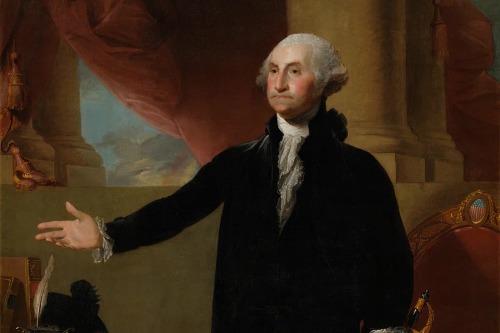
In his farewell address, delivered upon choosing not to seek a third term as president, George Washington left behind more than a mere exit message. His speech became a crucial guide for the future of the United States, offering advice that would resonate for generations. Washington warned against the dangers of political factions, cautioning that division within the government could lead to the ruin of the nation. This early insight into American political culture highlighted the importance of unity, urging citizens to avoid partisan conflicts and to prioritize the common good.
Additionally, Washington strongly advised against forming entangling alliances with foreign nations. He believed that the United States should avoid becoming embroiled in the political conflicts of Europe, thus preserving its sovereignty and focusing on its own growth. This emphasis on neutrality in foreign relations would influence American foreign policy for much of its early history. His farewell speech was more than just a political statement; it was a call to protect the future of a fledgling nation and set the tone for America’s diplomatic stance and internal unity.
2. Patrick Henry’s “Give Me Liberty or Give Me Death” (1775)
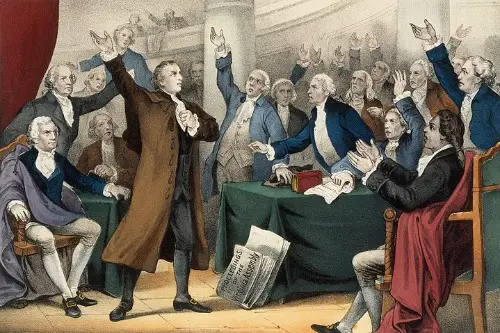
Patrick Henry’s famous speech, delivered at the Virginia Convention in 1775, encapsulated the fiery spirit of the American Revolution. As tensions between the American colonies and Great Britain reached their peak, Henry passionately argued that the colonies could no longer endure British tyranny. His declaration, “Give me liberty, or give me death,” became an immortal rallying cry for those who sought freedom from oppressive rule. Henry’s words were not just an expression of personal conviction; they represented a collective yearning for independence that would soon ignite the Revolutionary War.
The speech also marked a pivotal moment in the movement toward independence, inspiring many to join the cause. Henry’s forceful rhetoric and unyielding commitment to liberty helped galvanize support for the Continental Army and the cause of independence. His famous phrase underscored the necessity of action over mere words and served as a beacon of courage for the colonies in their struggle for freedom. Patrick Henry’s words remain etched in the annals of American history as a symbol of resistance and the indomitable desire for liberty.
3. Abraham Lincoln’s Gettysburg Address (1863)
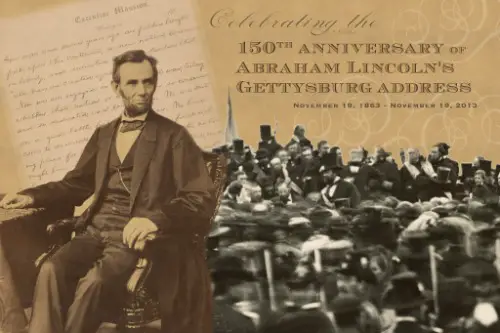
Delivered at the dedication of the Soldiers’ National Cemetery in Gettysburg, Pennsylvania, President Abraham Lincoln’s Gettysburg Address is one of the most iconic speeches in American history. Despite being brief, at just 272 words, Lincoln’s address profoundly reshaped the nation’s understanding of the Civil War. He reframed the conflict as a struggle not just to preserve the Union, but to affirm the principles of equality and freedom upon which the nation was founded. Lincoln invoked the Declaration of Independence and linked the war to the broader mission of achieving a “new birth of freedom” in the United States.
The speech also emphasized the importance of national unity, calling upon Americans to rededicate themselves to the cause of liberty and equality. Lincoln’s words served as a reminder of the sacrifices made by soldiers on both sides of the conflict and underscored the responsibility of all citizens to ensure the survival of a government “of the people, by the people, for the people.” The Gettysburg Address transcended its immediate context, becoming a timeless expression of American ideals that continue to inspire movements for justice and equality across the globe.
4. Sojourner Truth’s “Ain’t I a Woman?” (1851)
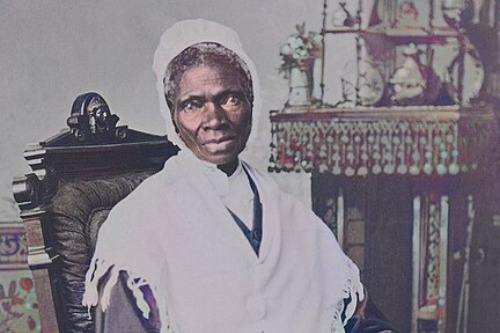
At the Women’s Rights Convention in Akron, Ohio, Sojourner Truth delivered a speech that would become a cornerstone of both the abolitionist and women’s rights movements. In her powerful address, Truth, a former enslaved woman, challenged the prevailing notions of gender and race in the United States. By asking the provocative question, “Ain’t I a woman?”, Truth highlighted the intersectional nature of her identity as both Black and female. Her words underscored the hypocrisy of a society that championed liberty while simultaneously denying basic rights to women and enslaved people.
Truth’s speech was groundbreaking not only for its call for women’s rights but also for its bold confrontation of racism. She used her personal experiences to challenge the prevailing stereotypes of Black women, emphasizing their strength, intelligence, and worth. Her speech resonated deeply with those who fought for the abolition of slavery and the expansion of women’s rights, and it continues to be a touchstone for discussions about race, gender, and equality in the United States.
5. Franklin D. Roosevelt’s First Inaugural Address (1933)
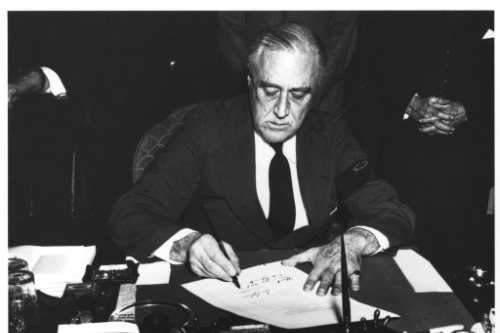
In the midst of the Great Depression, Franklin D. Roosevelt’s first inaugural address provided a much-needed injection of hope to a struggling nation. As the country grappled with widespread unemployment, poverty, and economic uncertainty, Roosevelt famously declared, “The only thing we have to fear is fear itself.” His words offered a sense of comfort and confidence, encouraging Americans to trust in their government’s ability to confront the crisis. Roosevelt’s tone was one of reassurance, offering both a diagnosis of the nation’s ills and a promise of renewal through government action.
The speech also laid the groundwork for the New Deal, Roosevelt’s ambitious plan to address the economic challenges facing the country. He called for bold action and government intervention in the economy, advocating for policies that would provide relief to the unemployed, regulate financial institutions, and create new opportunities for economic growth. Roosevelt’s inaugural address set the tone for a transformative era in American history, one in which the federal government would play a central role in shaping the nation’s future.
6. John F. Kennedy’s Inaugural Address (1961)
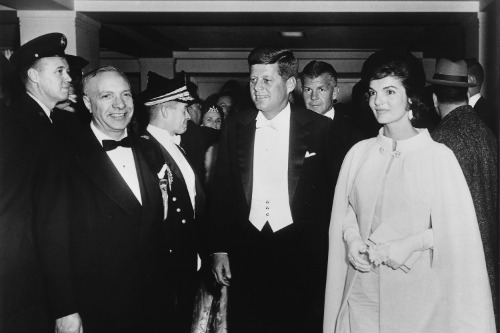
John F. Kennedy’s inaugural address, delivered on January 20, 1961, remains one of the most memorable speeches in American political history. With the nation in the midst of the Cold War and facing challenges abroad and at home, Kennedy’s speech called for a new era of leadership and service. His famous challenge, “Ask not what your country can do for you—ask what you can do for your country,” urged Americans to move beyond individual concerns and focus on the collective well-being of the nation. This call to action resonated deeply, inspiring a generation to think about their role in shaping the future.
Kennedy’s speech also addressed the importance of global leadership, emphasizing America’s responsibility to promote freedom and democracy worldwide. He spoke directly to the Soviet Union, warning that the United States would not back down in the face of threats but would seek peaceful solutions wherever possible. His vision of a new frontier of hope, peace, and progress resonated with Americans eager for change and optimism. Kennedy’s inaugural address set the tone for his presidency, inspiring both domestic reforms and a renewed commitment to American ideals on the world stage.
7. Dr. Martin Luther King Jr.’s “I Have a Dream” (1963)

On the steps of the Lincoln Memorial during the March on Washington for Jobs and Freedom, Dr. Martin Luther King Jr. delivered his iconic “I Have a Dream” speech, which became a defining moment in the Civil Rights Movement. King’s vision of racial equality and justice stirred the hearts of millions of Americans and people around the world. In his speech, he painted a powerful picture of a future in which people would be judged by the content of their character, rather than the color of their skin. His words became a rallying cry for the movement to end segregation, disenfranchisement, and racial violence.
Dr. King’s message of hope and unity resonated deeply with those who had long suffered under the weight of systemic racism. His speech emphasized the importance of nonviolent protest and the need for continued efforts to bring about change. The “I Have a Dream” speech became an enduring symbol of the struggle for civil rights and continues to inspire movements for racial justice, equality, and human rights today.
8. Barbara Jordan’s Keynote Address at the Democratic National Convention (1976)
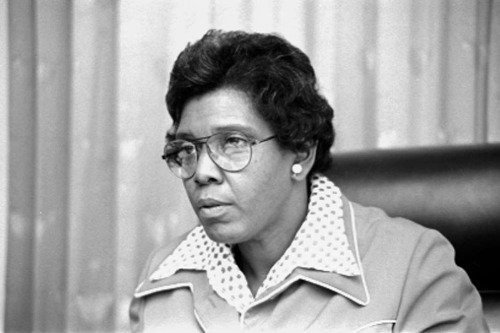
In 1976, Barbara Jordan made history as the first Black woman to deliver a keynote address at a major political party’s convention. Her powerful and eloquent speech at the Democratic National Convention captured the spirit of unity and hope that defined the political landscape of the time. Jordan’s words emphasized the importance of unity and the shared values that bind Americans together, regardless of race or background. She called for a politics of inclusion, highlighting the strength that comes from diversity and the need for a government that serves all people.
Jordan’s speech was particularly significant in the context of the political climate of the 1970s, which had been marked by racial tensions, the fallout from the Watergate scandal, and the struggle for civil rights. Her address was a reminder that the country’s greatness lies in its ability to overcome division and work together for the common good. Barbara Jordan’s keynote address remains a seminal moment in American political history, not just for its eloquence but for the example it set for women, people of color, and future generations of leaders.
9. Ronald Reagan’s “Tear Down This Wall” Speech (1987)

Standing at the Brandenburg Gate in Berlin on June 12, 1987, President Ronald Reagan delivered a powerful speech that became a symbol of the Cold War’s end. In his address, Reagan called on Soviet leader Mikhail Gorbachev to “tear down this wall,” referring to the Berlin Wall, which had divided East and West Berlin for over two decades. His challenge to Gorbachev was a bold declaration of America’s commitment to ending the oppressive regimes of Eastern Europe and promoting the values of freedom and democracy. Reagan’s speech resonated deeply with those living under Soviet rule, inspiring hopes for change.
The speech became one of the defining moments of Reagan’s presidency, symbolizing his vision for a freer and more democratic world. Reagan’s words echoed across the Iron Curtain, signaling the United States’ determination to stand firm against Soviet tyranny and to support the aspirations of those yearning for liberty. The Berlin Wall would eventually fall in 1989, and Reagan’s famous speech remains a testament to the power of words in shaping the course of history.
10. Elizabeth Cady Stanton’s “Declaration of Sentiments” (1848)
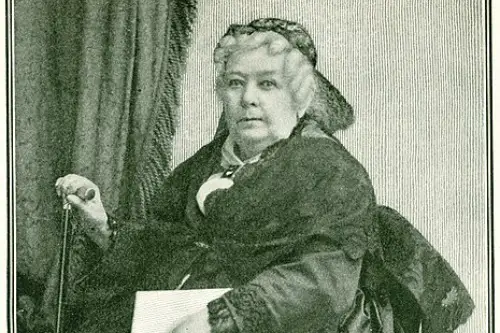
At the Seneca Falls Convention in 1848, Elizabeth Cady Stanton delivered the “Declaration of Sentiments,” a groundbreaking speech that called for women’s equality in all aspects of life. Drawing inspiration from the Declaration of Independence, Stanton’s speech demanded that women be granted the same rights as men, including the right to vote. This bold statement of equality laid the foundation for the women’s suffrage movement and marked a turning point in the fight for women’s rights in the United States.
Stanton’s call for gender equality was revolutionary for its time. By highlighting the legal and social inequalities faced by women, she challenged the patriarchal structures that dominated American society. The “Declaration of Sentiments” became a rallying cry for women’s rights activists, who would continue the struggle for equal rights for decades. Stanton’s work at Seneca Falls marked the beginning of a long and difficult journey toward achieving women’s suffrage and equality under the law.
11. Theodore Roosevelt’s “The Man with the Muckrake” (1906)
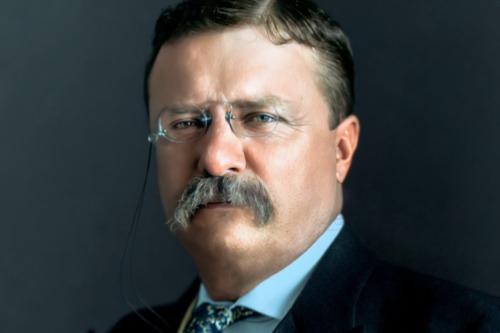
In 1906, President Theodore Roosevelt delivered a speech known as “The Man with the Muckrake,” in which he addressed the role of journalists in exposing corruption and social injustices. Roosevelt praised the muckrakers—journalists who uncovered and reported on the dark side of American society— for their courage in revealing the truth. However, he also cautioned that this practice should not descend into sensationalism, which could damage the reputation of innocent individuals and undermine the integrity of the press.
Roosevelt’s speech highlighted the delicate balance between a free press and the responsibility of journalists to act ethically. He recognized the importance of exposing corruption but also warned against the dangers of distortion and exaggeration. The speech underscored his belief in the need for responsible journalism to support democracy, while also emphasizing the role of citizens in holding both the government and the press accountable.
12. Lyndon B. Johnson’s “We Shall Overcome” Speech (1965)
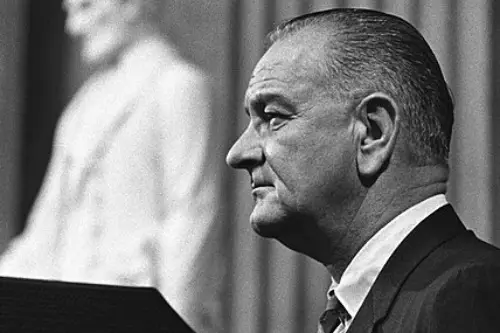
In 1965, President Lyndon B. Johnson delivered a powerful speech to Congress, urging the passage of the Voting Rights Act. The speech, given in the wake of the Selma marches, echoed the famous words of civil rights leader Dr. Martin Luther King Jr., who had used the phrase “We shall overcome” as a call for justice and equality. Johnson’s speech reinforced the moral imperative to address racial discrimination and ensure that all Americans had the right to vote.
Johnson’s words represented a turning point in the struggle for civil rights, as he urged Congress to pass landmark legislation that would dismantle the legal barriers to voting faced by African Americans in the South. The speech helped galvanize support for the Voting Rights Act of 1965, which became a key achievement of the Civil Rights Movement. Johnson’s address was a call to action that advanced the cause of equality and left a lasting impact on American democracy.
13. Barack Obama’s “A More Perfect Union” Speech (2008)

In 2008, during his presidential campaign, Barack Obama delivered one of his most memorable speeches, addressing the complex issue of race in America. The speech, titled “A More Perfect Union,” was given in response to controversy surrounding his former pastor, Reverend Jeremiah Wright. Obama used the moment to reflect on the history of race in the United States, acknowledging the pain and divisions that had shaped the nation. However, he also emphasized the shared values that could unite Americans across racial lines.
Obama’s speech was a thoughtful and unifying message that sought to bridge the divide between different communities. He called for a collective effort to confront America’s racial challenges while emphasizing hope, understanding, and the need for change. “A More Perfect Union” demonstrated Obama’s ability to speak honestly and empathetically about difficult issues while inspiring a vision of national healing. His words continue to resonate in discussions about race and unity in America today.


